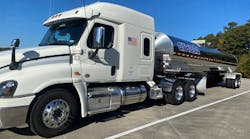American Trucking Associations leaders called on US media outlets to stop their inaccurate and sensationalized reporting on a so-called ‘study’ claiming that a number of commercial truck drivers use drugs or alcohol while behind the wheel.
The ‘study’ which has been cited by several news outlets, was conducted by the Universidade Estadual de Londrina in Brazil. Its findings were based on self-reporting and limited biological testing of drivers from Latin America, Australia, and (allegedly) the United States. The results stand in stark contrast to the ongoing data collected by US authorities based on biological testing of professional truck drivers in the United States.
“We know from the Federal Motor Carrier Safety Administration that in the most recent year available—2011--the drug use violation rate for professional truck drivers was 0.9%, in other words, less than 1%. Similarly, the alcohol violation rate for US truck drivers was .19% (less than one-fifth of one percent) in 2008, the most recent year for which data are available,” said ATA President and CEO Bill Graves.
In fact, in 2011 only 1% of large truck drivers involved in fatal crashes had a blood alcohol concentration (BAC) level of .08 or higher, compared with 24% of car drivers and 29% of motorcyclists. “These numbers show the strength of our industry’s commitment to safe highways and the hard work of law enforcement to root out bad actors that comprise a very small percentage of our industry,” he said.
“When I recently assumed the role of chairman of American Trucking Associations, I said one of my primary aims was to increase the level of respect we have for our professional drivers,” said ATA Chairman Phil Byrd, president of Bulldog Hiway Express, Charleston SC. “I can think of nothing more disrespectful than being tarred as a drug user or drunk driver based on inaccurate reporting and a specious study. The outlets that ran with this story, and did not try to verify its accuracy with US data, owe the millions of safe, dedicated drivers that deliver America’s most essential goods every day a sincere apology.”








